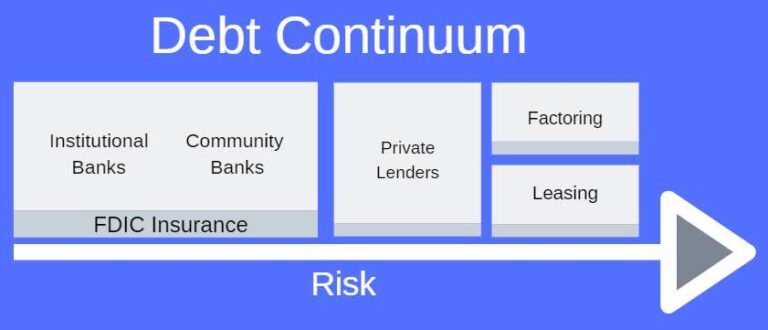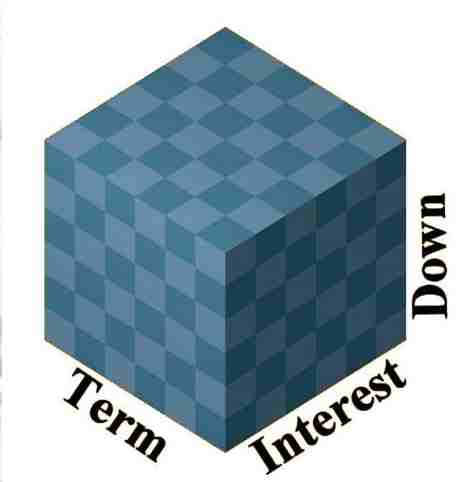Enjoy the following excerpt from my FREE What You Need to Know About Starting a Business course where I talk about two common small business funding options for small businesses. We will discuss what I call the debt continuum, how lenders control risk and reward, and the value proposition for equity financing investors you can use to convince investors to fund your business.
Video Transscript [Lightly edited for clerity]
Let’s talk a little bit about funding options as a small business. The first thing I want to talk about is there are principally two ways to fund your entity. We’ve talked a little bit about the difference between equity and debt. I’d like to talk a little bit more about the debt first, in what I call the debt continuum.
Debt Funding Options

Institutional Banks
On the extreme end of the debt continuum, we have what we call institutional banks. Wells Fargo, US bank, these are very big banks and they have the best rates generally speaking but quite frankly if the person’s wearing a nametag with Vice President of this particular bank, he doesn’t have a whole lot of discretion quite frankly. There are actuaries that sit in the back that look over your financials and make a determination whether a loan is going to be successful or not. it’s purely based on the numbers. So quite frankly they could require a 700 credit score to be able to qualify for this particular loan and your 699 means you’re out because some actuary has determined that the 699 credit score failure rate doesn’t meet this particular package deal. Because they have these defined packages, loan officers are not making a lot of judgments and make very few mistakes. That’s why they charge the least amount for them.
Community Banks
Inside of that we also have what we call community banks. Now understand the word “bank” means FDIC insured and when you’re FDIC insured, which is government insurance to that bank or the people who made the deposits, that says that no matter what happens to that bank, they will make sure you’ll get your money back. That’s an insurance policy, and for that, the banks have to cooperate in a certain way. And as a result of that, they can’t be very risky. So, they’re risk-averse simply by the fact that they’re a bank.
But we still have this community bank. Let me give you another sea story. I had a client that had a landscaping business and he was buying a dump truck. He went to the institutional banks and every one of them turned him down. The reason [they gave] was you do not have the cash flow in your landscaping business in the wintertime to cover the principal and interest payments for the dump truck. So they said no. He went to the community banks, the community banks remember are still banks, the community banks said we’ll do that loan but here’s what we’re going to do. You’re going to have double payments during the months of the summertime and none during the wintertime.
So, at the end of the day, they were able to manipulate a few variables within that loan package whereas the institutional bank was looking at coloring in all the boxes. This person [at the community bank] might also say you got a 699 credit score, okay we’ll work with you, maybe we will bring in the SBA. With the SBA they’ll guarantee your particular loan so we know we will be whole or. Or we need some additional collateral or something like that but they’re more likely to work with you.
Private Lenders
Inside of that, we have what we call private lenders, the Accion’s of the world [now DreamSprings]. There are a bunch of investors that are giving money to a portfolio manager who goes out and looks at various loan packages. They’re not FDIC insured. They accept much more risky types of programs [like your new business]. Quite frankly it’s private money and they may be willing to give you a particular loan.
Specialty Lenders Factoring
If we move even further in, we have specialty lenders, like lenders that only lend on receivables. Sea story time. So, I had a business that was probably about a $2,500,000 revenue company and I won about a $1,000,000 contract. Now as you would imagine on that day, I was very excited. Two months later I was looking for a gun and a bullet to put in my forehead because here’s how that worked out. I was in a service-related business. We billed out to the customer roughly $100,000 a month. I’m in a 7% margin business so if you do the math on that backward, I have about $92,000 worth of expenses between payroll and my fixed expenses that I have to go ahead and pay. As owners, we get to split that other $7,000 every month. Here’s the problem, we have to work 30 days before I can submit an invoice to my client. Another 30 days have elapsed now I have another invoice I submit to them. So, I’ve got invoices now amounting to $200,000 and I’m broke. I got no more money. I didn’t have that number one thing “access to capital” What I had was $200,000 but I spent it [to fill my accounts receivable pipeline]. I still haven’t gotten paid and Monday is a payday. What am I going to tell my employees? “I can’t pay you”. How many do you think would stay around till Tuesday? So, I have to resort to desperate measures to get that money. This is what we call factoring. I sell my receivables for 90 cents on a dollar because I need the money now. [Remember] I’m in a 7% margin business so guess what happens when you give away something that’s 10% for one that’s 7%? Now I’m losing $3,000 a month. If I had access to capital, I’d be making that money but without it, I didn’t have that.
Specialty Lenders Leasing
We have people who act as a leasing company. For example, maybe you own an asset. You already own that dump truck but you need cash to grow. It’s totally paid off so you give that asset to a leasing company that now creates payments. They are basically refinancing your loan. It is like you getting a second mortgage on your house or in this case literally selling the house to somebody and renting it back. But you need that capital to be able to grow. So lots of times when you don’t have access to capital guess who makes the money? It’s the lenders. The people who have the money and that’s why the rich keep getting richer and the poor keep getting poorer. Okay, so you understand how that works. Access to capital is number one.
3 Controls For Debt Funding Options

I want next to describe to you that from a debt financing prospective debt givers have three controls. One of them is interest rates. What do you think the other two are? The term of your particular loan and the down payment that you have.
I like to tell the story of when my son, who is an individual consumer, ended up buying a brand new Jeep Grand Cherokee. He financed it for 7 years, put nothing down and I think it was like 1% interest. You as a business want to use that vehicle as your fleet vehicle, that same vehicle probably could only be financed for 3 years, would probably require you have to put 30%, and that interest rate is probably going to be a little bit higher than what consumer market. So instead of getting it like at 4 or 5% for a car, you might be paying 7 or 8%. Same vehicle two different ways require to pay for it.
So, you have to understand that when you go in, if you’re focusing on interest rates, it’s like a box. Being a dyslexic, I think of things in three dimensions. When you want to squeeze the interest rate, guess what happens? It’s like a big balloon, it blows up another place. “There’s no problem, you want a lower interest rate okay give me a bigger down payment to reduce my risk or let’s shorten the term because I know that businesses go out of business.” 51% of them are going to be out of business in three years. “So, let’s make it a two-year term” because now I only have a 30% chance of failure. Do you see what I’m getting to? They’re all figuring out which one of those boxes they can concentrate on and boom, the other ones expand [to maintain the volume of the box]. That’s why we have three different controls.
Equity Funding Option
Now on the other side of the equation, we have the equity funding option. I have a stock certificate there because I think people can kind of recognize it in terms of stock or as equity. So what happens when you own stock? The company pays dividends to you at the end. That’s the profit that [the business] brought in and now they want to redistribute some of that [to investors]. They may hold back [some profit] and reinvest [it] in the business to grow the asset value of that particular stock.
But it doesn’t have to be stock. if you’re a limited liability company for example we don’t issue shares of stock. When people invest money into a particular business it entitles them to a percentage of the profits once the business makes them. They can also claim losses on their income taxes as well. Those businesses are what we call pass-through entities, so the investors actually have to either pay those taxes or they get those losses that they can claim against other sources of income.
As we sit and talk about equity it is probably going to be the number one way that you’re going to raise capital. This could come from friends and family. it could come from the fact that maybe you own a home and you’re going to extract equity out [with a HELOC] or maybe it’s because you have a 401k and you’re going to borrow money from your 401k because you think that your business will have a better return than the market.
I had a co-counselor for a long time and she wrote a book about compassionate lending. She argued that we all know ten people in our lives that could be an investor in our particular business. Of course, our clients would always challenge her. “I don’t think I have ten people who could invest in my particular business”. She would reply. “Do you go to a doctor?” “Of course, I go to the doctor” they would reply. “What does your doctor do with the surplus money he has? Does he invest in the stock market?” Those are kind of passive things that by the way are very tax disadvantageous ways to invest. But if I invest in your particular business, I have a good upside. I might get a better cash flow from your business. By the same token, I might be able to take some losses to offset my high salary that I earn. Loses provide additional benefits for that individual high net worth investors to invest in your particular business. So, there are always people that we deal with, people in the medical profession, the people you buy your cars from, and other high net worth people that you bump into. Or maybe you’re their customer and they might very well [want to] be an investor in your business.
Your business has people that are upstream and downstream of you. You have vendors who sell you a product. If I’m a vendor and I’m selling you product and I have an equity stake in your business because I’ve taken some of my surplus money and invested in your particular business you buy that product for me, I get a lot of that back. So, it behooves me as that vendor if I believe in your business model and your business plan I would want to invest in your particular business.
Quite frankly if nobody will invest in your business maybe there’s something [wrong]. You may need to hold a mirror up and take a look at it and say maybe there’s something to this, maybe it’s not something that I really want to go full tilt on.
What are your best funding options for your business?
Related Posts:












